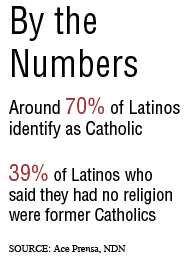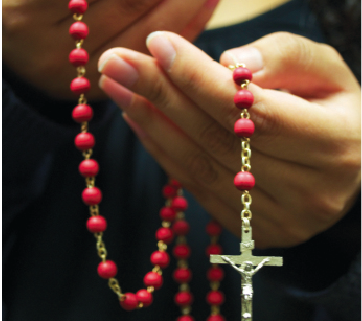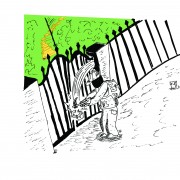Religious Secularization
The cross of Christ hanging from a gold necklace is being Catholic. For many second generation Latinos, this is as far as their relationship with God extends, a tendency that epitomizes their gradual move towards an evanescing faith in God.
While a growing number of Latinos identify themselves as non-religious, most say they still retain certain cultural aspects of Catholicism and thus consider themselves “culturally Catholic.” According to Ace Prensa, secularity among Latinos increases from 8 percent in the first-generation immigrants to 14 percent in the second-generation.
For these second generation Latinos, Catholicism is not a way of explaining their faith in God, but rather a cultural identifier. Though they do not practice it through the reception of all the sacraments, they still claim ties to Catholicism.
A young man who wished to remain anonymous said, “I don’t know much about the actual religion. It’s just how I was raised. I go to church occasionally, I have a rosary in the rearview mirror of my car, and I help my mom set up of the ‘nacimiento’ for Christmas and I really enjoy the big celebration my family does for the Virgin Mary. But as far as my relationship with God…well I guess that is my relationship with God.”
For Latinos like him, the connection between Catholicism and culture is much stronger than that of Catholicism and faith. Religion is not a matter of establishing a faith-based communion with God, but a matter of inheritance.
Their parents are Catholic and by default, they too inherit this religion. While this bestowal of Catholicism teaches them that babies should be baptized and that taking the Eucharist is the most sacred moment during Sunday mass, it does not teach them the spiritual meaning behind these practices.
This lack of spiritual knowledge is especially evident during the celebration of holy days such as Ash Wednesday. Many, from devout Catholics to cultural Catholics, gather on this day to have ashes imposed on their foreheads. But, the presence of so many new faces raises questions about the knowledge and credence in the paramount doctrines of their religion.
Upon asking a UCLA student, who identifies himself as Catholic, what the significance of Ash Wednesday is, he responded: “It’s kind of embarrassing to admit, but I have no idea. It’s just something I’ve done most of my life.”
He, like many other Latinos, chooses to be marked with the ashes of repentance on this Wednesday, but do not know why. Stripping this sacred practice from its spiritual

meaning and transforming it solely into a cultural practice, makes the ashes on their forehead less a symbol of mourning and repentance and more a symbol of a deteriorating faith in God.
Moreover, for the increasing number of non-religious second-generation Latinos,Catholicism has become one of the many aspects of their culture that is only ritualistically part of quotidian life, an inclination that does not accord with my definition of spiritual faith. Though they religiously obey Catholic practices, they are devoid of the fundamental characteristic on which religion is based: an absolute and walking faith in God.











Leave a Reply
Want to join the discussion?Feel free to contribute!